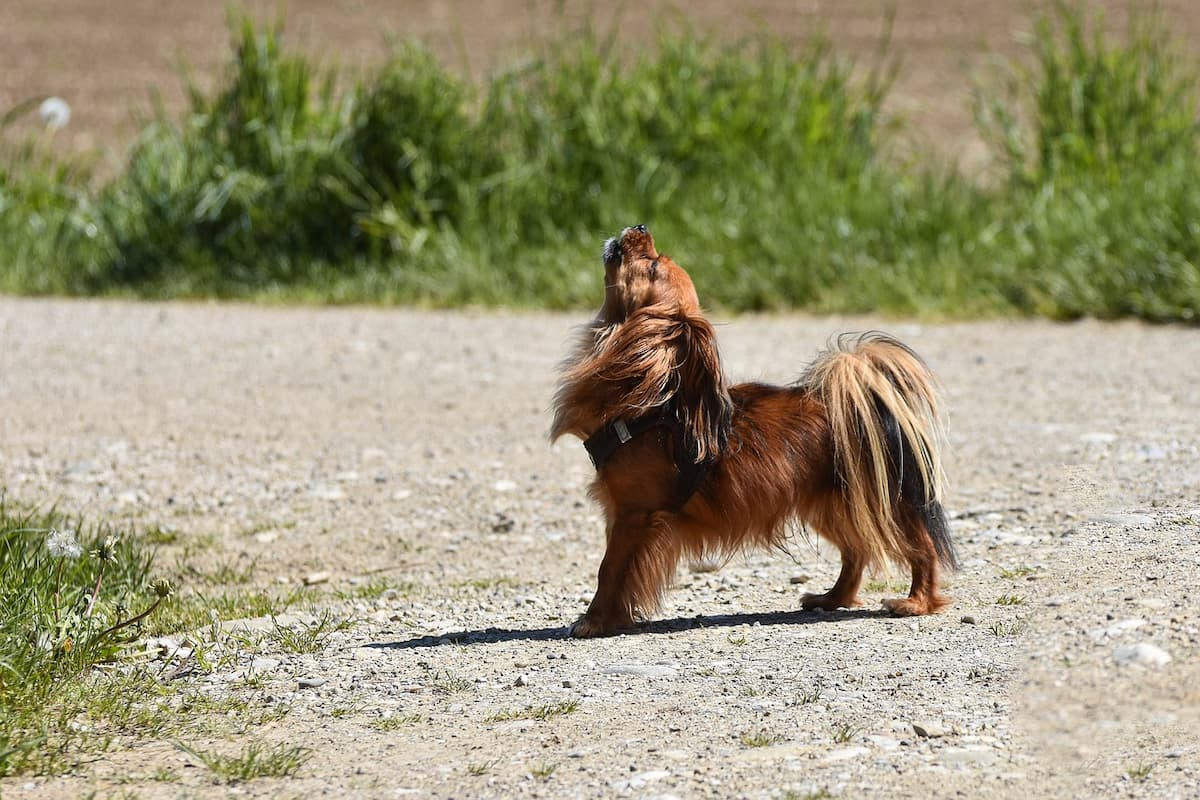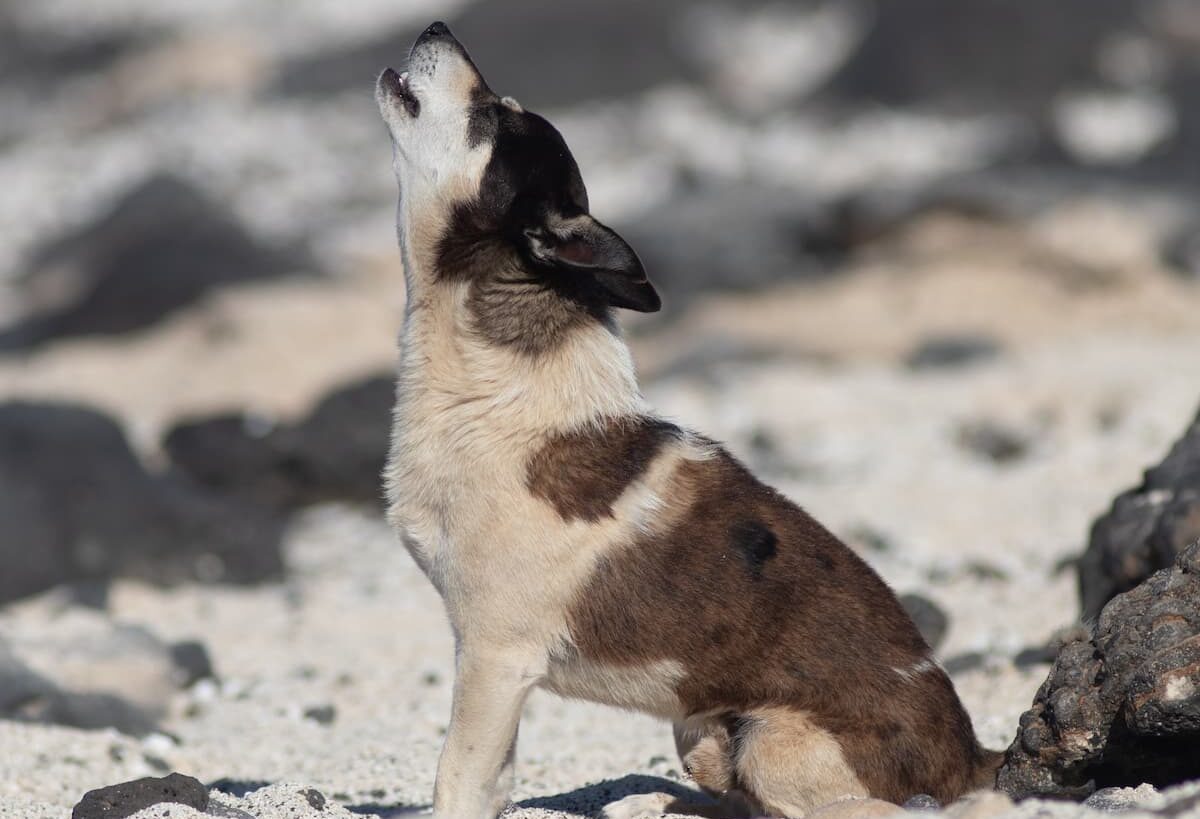Have you ever been woken up by a howling dog in the middle of a peaceful night?
I know I have, and let me tell you, it can be both eerie and frustrating.
As I lay there in bed, struggling to make sense of the haunting sound reverberating through my neighborhood, I couldn’t help but wonder: Why do dogs choose the most inconvenient of times to unleash their vocal prowess?
Read on to find out.
Why Dogs Howl in the Middle of the Night?
Have you ever found yourself jolted awake in the silence of the night, only to be greeted by the eerie howls of dogs echoing through the darkness?
It’s a peculiar and mysterious sound that can send shivers down our spines.
But fear not!
Dogs howl for a variety of reasons, and understanding this canine behavior can shed some light on their mysterious midnight serenades.
Dogs, as descendants of wolves, have ingrained instincts that often drive their behavior.
One of these instincts is their primal need to communicate.
Howling serves as a form of self-expression and a means of communication between members of a pack, and even though our domesticated dogs may live comfortably in our homes, this innate behavior still lingers within them.
Here are a few possible reasons why your furry friend may unleash their inner howler in the middle of the night:
Calling Out to Their Pack
When dogs howl at night, they may be trying to reach out to other dogs nearby.
Howling functions as a way to gather the pack or alert others to their location.
Your dog’s keen sense of hearing may pick up on distant howls or other noises, triggering their instinct to respond.
Loneliness and Separation Anxiety
Dogs are social animals, and being separated from their human companions or canine friends can lead to feelings of loneliness and anxiety.
Midnight howling could be their way of expressing distress or seeking reassurance that they are not alone.
The darkness amplifies their feelings of isolation, and the haunting sound seems to echo their longing for company.
Providing ample exercise, mental enrichment, and ensuring they have a cozy den-like space to retreat to can help alleviate this nocturnal loneliness.
Reacting to External Stimuli
Dogs have highly sensitive hearing, and certain sounds or stimuli in the night can trigger their instinct to howl.
Loud sirens, distant wildlife calls, or even the sound of other dogs howling can set off a chorus of midnight serenades.
If your pup’s howling seems to coincide with specific noises, it might be helpful to investigate the source and address any potential triggers, like closing the windows or blocking noise entry points.
Understanding why dogs howl in the middle of the night requires us to tap into their primal instincts.
Whether it’s a desire for connection, an expression of anxiety, or a response to external stimuli, these nocturnal serenades are a part of their canine nature.
So, the next time you find yourself listening to your dog’s midnight howls, embrace the unique bond you share and remember, they might just be trying to find their place in this ancient chorus of communication.
FAQ
Q: Why do dogs choose the middle of the night to howl?
A: Well, dogs are descendants of the mighty wolves, who were known for their haunting howls.
Even though domesticated, our furry friends still have some of those ancient instincts.
It turns out that the middle of the night can be a particularly captivating and peaceful time for dogs.
With fewer distractions, they can better tune into their surroundings and let out their melodious voices.
Q: What triggers a dog to start howling at night?
A: Dogs communicate through various vocalizations, and howling is one of them.
When howling at night, dogs may be responding to external stimuli.
Sensitive hearing allows them to pick up on distant sounds that we humans may not even notice.
So, that distant ambulance siren, the occasional owl hooting, or even the neighbor’s cat strolling around could kickstart their nocturnal symphony.
Q: Does howling indicate that a dog is unhappy or in pain?
A: Not necessarily!
While it’s essential to pay attention to any signs of distress in our furry friends, howling alone doesn’t always imply unhappiness or pain.
Sometimes, dogs howl purely out of joy or excitement.
For instance, if they hear your car pulling into the driveway, they might greet you with a chorus of howls, happily expressing their anticipation.
Q: Can dogs howl due to separation anxiety?
A: Absolutely!
Separation anxiety is a common issue among dogs, and howling can indeed be one of the signs.
When left alone, some dogs may feel anxious or stressed, leading to excessive vocalizations like howling.
It’s important to understand the underlying cause and consult a professional if you suspect separation anxiety in your furry companion.
Q: How can I minimize late-night howling?
A: Well, it depends on the root cause.
If external stimuli, such as unfamiliar noises, trigger the howling, you can try minimizing the dog’s exposure to those triggers.
Closing the windows or using white noise machines might help drown out the sounds that set off your pooch.
For dogs suffering from separation anxiety, behavior modification techniques and seeking professional advice may prove beneficial.
Q: Are certain dog breeds more prone to howling at night?
A: While all dogs have the potential to howl, certain breeds have a reputation for being more vocal.
Breeds such as the Siberian Husky, Alaskan Malamute, or Beagle are known to possess a stronger predisposition for howling.
However, it’s important to note that individual characteristics play a significant role, and not all dogs from these breeds will necessarily serenade you under the moonlight.
Q: What if my dog’s nighttime howling becomes excessive or disruptive?
A: Excessive and disruptive howling might be a sign of an underlying issue, and it’s best to seek professional advice.
A veterinarian or an animal behaviorist can provide valuable insights and help identify the cause behind the relentless midnight concerts.
Remember, understanding and patience are key to resolving any behavioral concerns in your beloved furry companion.
Q: Can I join my dog’s midnight howling party?
A: Well, why not? As long as you live in an environment where your enthusiastic vocalizations won’t disturb the neighbors, joining in on the fun can create a unique bonding experience with your pooch.
Just be aware that your neighbors might question your sanity if they catch you serenading the moon together!
Farewell Notes
So there you have it, folks!
The mysterious midnight serenades of our beloved pooches explained.
We’ve learned that dogs have an instinctive need to communicate with their pack, even if it involves letting out a spine-chilling howl in the dead of night.
Whether it’s a throwback to their wild ancestry or a result of boredom, anxiety, or even the moon’s gravitational pull, it’s clear that howling is just another unique way for our furry friends to express themselves.
So, the next time you find yourself awakened by a symphony of canine howls under the stars, instead of yelling, “Shush!” into the night, take a moment to appreciate the ancient melody.
Who knows, maybe it’s their way of singing you a lullaby or simply reminding you that even in the darkest hours, they’re always by your side.
So sleep tight, dog parents, and embrace the nocturnal concert, knowing that your four-legged friends have howling tales to tell.
As the moon wanes and the sun begins its ascent, let’s remember that our furry night howlers are just one of the many wonders of the animal kingdom.











